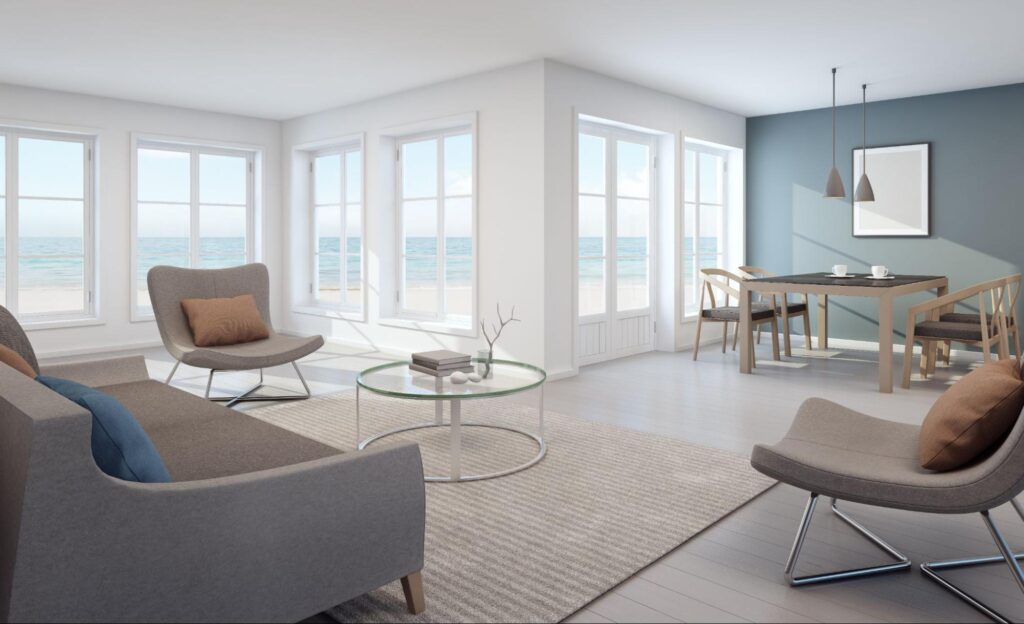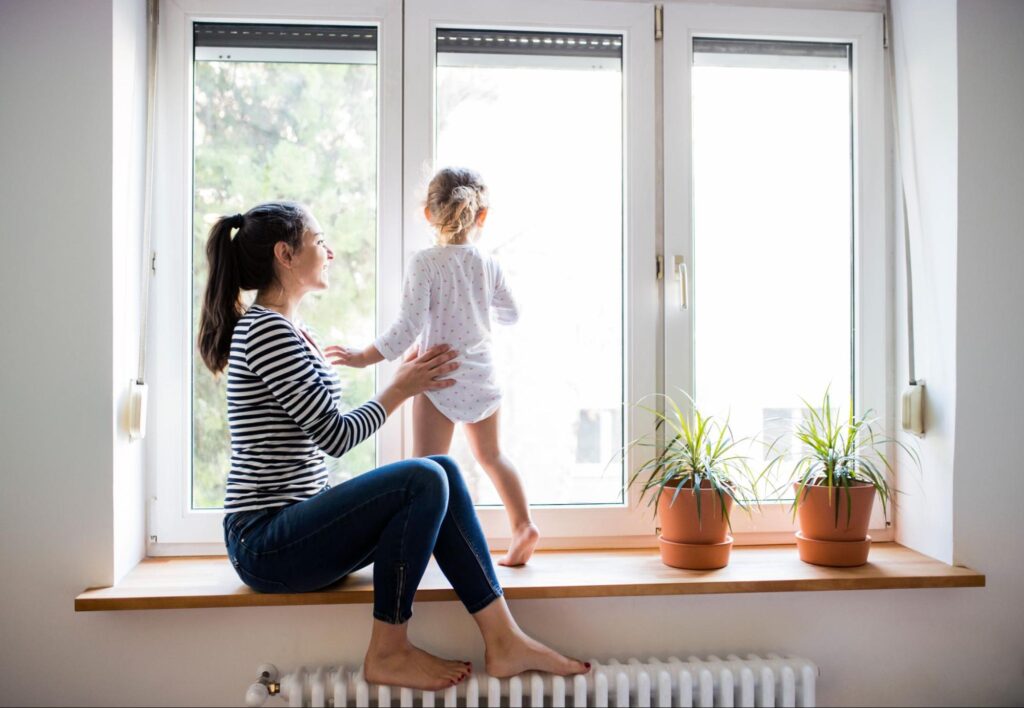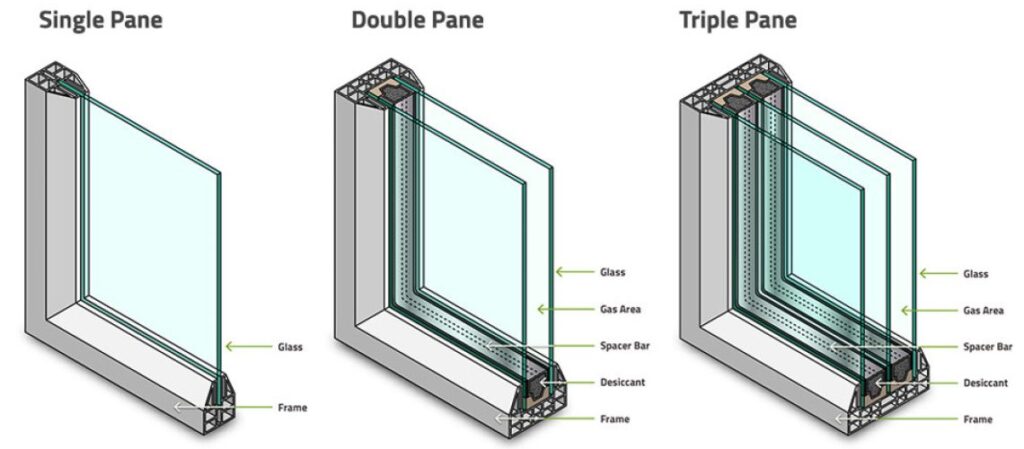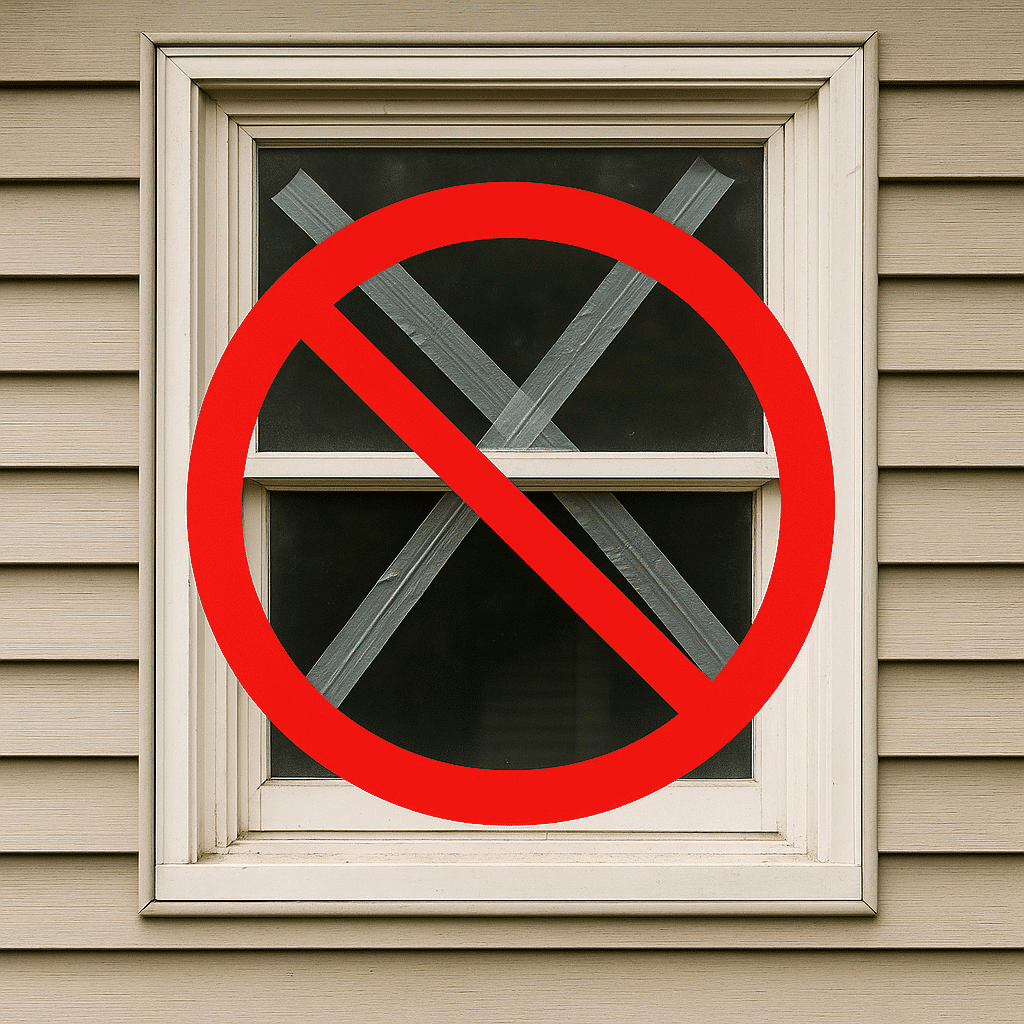
At FHIA Remodeling, we've spent years helping homeowners upgrade to top-quality, energy-efficient windows. When it comes to window replacement, making the right choice between single-pane, double-pane, and triple-pane windows is crucial for cost savings, noise reduction, and enhanced security.
While the decision can feel overwhelming if you're unsure about the differences between these options, our experts are here to break down everything you need to know. Keep reading to learn about your window replacement options and how to choose the perfect, secure solution for your home.
What Are Window Panes?
Window panes are the glass sheets that serve as the primary barrier between your home's interior and the outside environment. Nowadays, manufacturers often use multiple panes of glass separated by sealed spaces to create insulating layers. These spaces can be filled with inert gases like argon or krypton to enhance their thermal performance. Think of panes as the "working" part of your window — while the frame provides structure, the window panes control how effectively your solution manages temperature, sound, and light transmission.
Single-Pane Windows
Single-pane windows are the most basic. They consist of one sheet of glass within a frame. In the past, they were a standard in many homes. Now, they are most common in sheds, historic buildings, and garages.
Typically, the thickness of the glass is around around 1/8". As for the price, you can expect to spend a few hundred dollars per piece. While cheaper upfront, a single pane provides lower thermal performance, so you might deal with high cooling and heating expenses over time.
Advantages
Let us discuss the benefits of single-pane windows:
- Cost-effective: The most budget-friendly window option, both in terms of initial purchase and replacement.
- Easy repairs: If the glass breaks, replacing it is simpler and cheaper than multi-pane alternatives.
- Good for non-living spaces: Ideal for sheds, garages, or historic buildings where insulation isn’t a priority.
Disadvantages
Unfortunately, there are drawbacks, too. Here are some of them:
- Poor energy efficiency: Provides little energy insulation, which makes it harder to regulate indoor temperatures.
- Minimal noise reduction: Sound insulation is poor in these solutions, which is a significant disadvantage for homes in noisy environments.
- Prone to condensation: Without an additional layer of glass, they trap moisture and may promote mold growth.

Double-Pane Windows
Double-pane windows have two layers of glass separated by a space that’s often filled with an insulating gas, such as argon. The glass thickness typically ranges from 3/32" to 5/32", with the dual-pane structure providing enhanced durability and insulation.
When comparing single vs double-pane windows, the latter is more expensive. Expect to spend anywhere from a few hundred to thousands of dollars per piece. Common styles with double panes include casement, double-hung, and sliding solutions, all of which offer a blend of efficiency and practicality.
Advantages
Let’s explore the benefits of double-pane windows:
- Improved energy efficiency: The insulating gas between the panes reduces heat transfer, helps maintain indoor temperatures, and lowers energy bills.
- Enhanced durability: The dual-pane structure adds strength. It is more resistant to damage than single-pane alternatives.
- Versatile design options: Available in various styles, including casement, sliding, and double-hung windows, to suit different home aesthetics.
Disadvantages
Despite their benefits, double-pane windows have some drawbacks:
- Higher cost: More expensive upfront, with prices ranging from a few hundred to thousands of dollars per window, depending on size and features.
- More complex repairs: If the seal between the panes fails, condensation can form inside and require a full replacement rather than a simple glass swap.
- Not as effective as triple-pane: While they offer solid insulation, they don’t perform as well in extreme climates compared to triple-pane solutions.

Triple-Pane Windows
Triple-pane windows go a step further by adding another layer. In total, there are three layers with spaces in between, often filled with gas for superior insulation. Triple-pane glass typically ranges from 1" to 1 3/8" thick, with 1 1/4" and 1 3/8" being common.
Triple-pane windows are popular in cooler climates where maximum insulation is important. Their typical price range from a thousand to several thousand dollars. These are also used in Florida to reduce air conditioning costs and external noise. In brief, such solutions are created for maximum heat efficiency and advanced soundproofing.
Advantages
Here are the key benefits of triple-pane windows:
- Superior insulation: Three layers of glass with insulating gas minimize heat transfer most efficiently.
- Maximum noise reduction: The extra pane enhances soundproofing significantly.
- Better condensation control: Reduced temperature differences between indoor and outdoor surfaces lower the risk of condensation buildup.
Disadvantages
Despite their benefits, triple-pane windows have some downsides:
- Higher cost: More expensive than single- and double-pane options.
- Heavier weight: The added glass and gas make them bulkier, which may require stronger window frames and hardware.
- Complex repairs: If the seal fails, in the debate of a double vs triple pane, the former will win. Replacing or repairing a triple-pane unit is more difficult and costly than single- or double-pane windows.

Comparison
Now that you know the pros and cons of each, let’s compare them side by side based on energy efficiency, soundproofing, cost, and durability.
Energy Efficiency
Single-pane windows offer the least amount of insulation. On the other hand, three layers are great for energy saving. If you're experiencing extreme heat or you're looking for maximum comfort and fresh air, the third layer can make a major difference.
Sound Insulation
Single-pane windows are suitable for quieter neighborhoods where noise isn't a big problem. To soften the typical outside noise, go for a double. If your main priority is maximum noise reduction, a three-pane window is the best choice.
Cost Analysis
Single-pane windows are the most affordable option, costing several hundred dollars per window. If you're on a tight budget and need a quick solution, they may be the obvious choice. Double-pane windows offer a balance between cost and efficiency, ranging from a few hundred to a few thousand dollars per unit. Triple-pane windows provide the best insulation and noise reduction but come at a higher price, typically from a thousand to several thousand dollars per piece.
Climate Considerations
Most homeowners in Florida choose double-pane windows, which are typically enough to balance comfort and energy costs. However, triples are also a great choice if you are looking for top-tier insulation and unmatched thermal properties.
Durability and Maintenance
If you're looking for a storm-resistant option and utmost longevity, triple-pane windows are for you. They're heavy and robust. Many people say that they are the best windows for your home you can ever install.

|
Category |
Single-pane windows |
Double-pane windows |
Triple-pane windows |
|
Energy Saving |
Low |
Moderate to high |
Very high |
|
Sound Insulation |
Minimal |
Good |
Excellent |
|
Price |
💲 |
💲💲💲 |
💲💲💲💲💲 |
|
Climate Suitability |
Mild or very dry without extreme shifts |
Suitable for moderate to warm climates |
Best for extreme weather conditions |
|
Durability & Maintenance |
One of the best low-maintenance options, but doesn’t offer much protection against humidity |
Durable, easy cleaning |
Very durable |
How to Choose the Right Windows for Your Home
Make your window selection simpler by focusing on these important aspects:
- Consider additional features: For extra durability and protection, opt for impact-rated glass, high-quality frames, and specialized coatings to improve insulation and keep out heat.
- Balance cost and efficiency: Single-pane windows are the cheapest, but double- or triple-pane options offer better energy savings and lower utility bills.
- Consult an expert: A professional installer can recommend the best window type based on your home’s needs and climate.
Ready to upgrade? Contact FHIA Remodeling, your trusted window experts, to ensure the best fit for your home, energy efficiency, and long-term value.
Conclusion
When choosing between single-, double-, or triple-pane windows, consider Florida's climate, your soundproofing needs, and your budget. For most residents, double-pane offers the best balance of affordability and energy savings, helping to keep the heat out during the hotter months.
However, if maximum home insulation and noise control are a priority, upgrading to triple-pane may be worth the investment. Regardless of which option suits your needs, consulting with a professional for window replacement ensures the best results. Call FHIA Remodeling today to learn how we can help!
Frequently Asked Questions
What are the main differences between single-, double-, and triple-pane windows?
Single-pane windows have just one layer of glass, and insulation is minimal. On the other hand, a double-pane solution comes with two layers and insulating gas in between. A three-pane window adds a third layer to enhance temperature control and soundproofing even more.
Triple vs. double-pane windows: what's the difference?
Triple and double-pane windows differ in their construction and performance. Double-pane windows use two glass layers with insulating gas between them. Triple-pane windows add a third glass layer and a second gas-filled space, offering superior efficiency.
Which type of window is best for energy efficiency?
Choose double or triple for a high level of energy savings and better insulation. Both are effective at keeping your home cool during the summer and warm in winter, reducing the need for excessive HVAC use.
How do double and triple-pane windows improve sound insulation?
Double and triple-pane windows reduce noise through multiple layers of glass and gas-filled spaces between them. Each glass layer blocks different sound frequencies, while the gas chambers absorb and dissipate sound waves.
Is it worth putting in triple-glazed windows?
Triple-glazed windows are worth considering if you live in extremely cold regions or noisy areas, as they provide superior insulation, energy efficiency, and sound reduction. However, in moderate climates, double-pane windows often offer better value.
Can I replace single-pane windows with double- or triple-pane windows?
Yes, you can replace single-pane windows with double- or triple-pane ones. However, many older frames may not support the added weight and thickness, so frame reinforcement or full window replacement may be necessary.
70% off Installation
18 months no interest no payments




